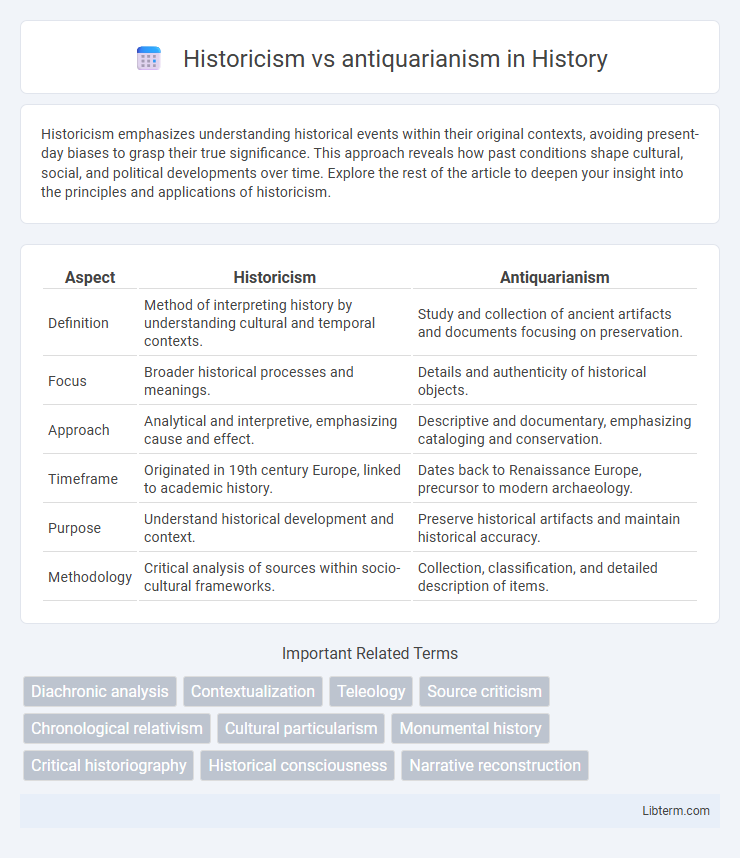Historicism emphasizes understanding historical events within their original contexts, avoiding present-day biases to grasp their true significance. This approach reveals how past conditions shape cultural, social, and political developments over time. Explore the rest of the article to deepen your insight into the principles and applications of historicism.
Table of Comparison
| Aspect | Historicism | Antiquarianism |
|---|---|---|
| Definition | Method of interpreting history by understanding cultural and temporal contexts. | Study and collection of ancient artifacts and documents focusing on preservation. |
| Focus | Broader historical processes and meanings. | Details and authenticity of historical objects. |
| Approach | Analytical and interpretive, emphasizing cause and effect. | Descriptive and documentary, emphasizing cataloging and conservation. |
| Timeframe | Originated in 19th century Europe, linked to academic history. | Dates back to Renaissance Europe, precursor to modern archaeology. |
| Purpose | Understand historical development and context. | Preserve historical artifacts and maintain historical accuracy. |
| Methodology | Critical analysis of sources within socio-cultural frameworks. | Collection, classification, and detailed description of items. |
Introduction to Historicism and Antiquarianism
Historicism emphasizes understanding historical events and cultures within their specific contexts, analyzing causes, effects, and underlying social dynamics to reveal broader patterns and meanings. Antiquarianism concentrates on collecting, preserving, and studying historical artifacts and documents, prioritizing detailed descriptions and factual accuracy over interpretive frameworks. The distinction highlights historicism's analytical approach versus antiquarianism's archival focus, shaping differing methodologies in historical scholarship.
Origins and Development of Historicism
Historicism emerged in the late 18th century as a methodological approach emphasizing the importance of historical context and the unfolding of events over time, contrasting with antiquarianism's earlier focus on the collection and description of artifacts without interpretive frameworks. Philosophers like Johann Gottfried Herder and Wilhelm Dilthey contributed to Historicism's development, promoting the understanding of cultures and societies as products of their unique historical conditions. This intellectual movement laid the groundwork for modern historiography by prioritizing narrative coherence and the dynamic progression of history rather than mere preservation and cataloging of relics.
The Evolution of Antiquarianism
The evolution of antiquarianism highlights a shift from mere collection and description of artifacts to a more analytical and interpretive approach, emphasizing historical context and cultural significance. Unlike historicism, which seeks to understand the underlying causes and processes of history, antiquarianism traditionally prioritized detailed empirical evidence and material culture. Over time, antiquarian practices informed and enriched historicist methodologies, fostering a comprehensive understanding of the past that blends both empirical data and interpretative frameworks.
Key Differences Between Historicism and Antiquarianism
Historicism emphasizes understanding historical events within their broader social, cultural, and political contexts, seeking patterns and overarching narratives. Antiquarianism prioritizes the collection and detailed study of artifacts, documents, and other tangible historical objects without necessarily interpreting their broader significance. Key differences include historicism's analytical approach to historical causation versus antiquarianism's focus on preservation and empirical evidence gathering.
Methods and Approaches in Historicism
Historicism employs analytical methods that contextualize historical events within broader social, cultural, and ideological frameworks, emphasizing the dynamic interplay of causes and effects over time. It uses a critical approach to sources, interpreting documents and artifacts with attention to their historical circumstances to uncover underlying patterns and meanings. This contrasts with antiquarianism's descriptive cataloging and preservation focus, as historicism actively seeks to understand historical development through systemic analysis and theoretical insight.
Antiquarian Practices: Focus on Artifacts and Details
Antiquarian practices emphasize the meticulous collection and examination of artifacts, inscriptions, and material culture, prioritizing empirical details over grand historical narratives. This approach values the preservation and documentation of tangible evidence, such as manuscripts, coins, and monuments, highlighting the significance of physical objects in understanding the past. Unlike historicism's broader interpretive framework, antiquarianism centers on the specificity of individual relics to reconstruct history through direct observation.
Impact on Historical Scholarship
Historicism revolutionized historical scholarship by emphasizing the importance of context, causality, and change over time, fostering analytical frameworks that explore societies within their unique temporal and cultural settings. Antiquarianism, while foundational in preserving artifacts and documents, primarily contributed to historical knowledge through detailed collection and description rather than theoretical interpretation. The shift from antiquarianism to historicism marked a transition towards a more rigorous and critical methodology in historiography, influencing modern historical research and narrative construction.
Critiques and Limitations of Both Perspectives
Historicism faces critique for its tendency to impose grand narratives that may overlook the nuances of individual historical events, often leading to deterministic interpretations. Antiquarianism is limited by its focus on detailed collection and preservation of artifacts without sufficient theoretical framework, which can result in fragmented historical understanding. Both perspectives struggle to balance between broad contextual analysis and meticulous empirical detail, limiting their comprehensive application in historiography.
Historicism and Antiquarianism in Modern Contexts
Historicism in modern contexts emphasizes understanding historical events and cultural phenomena through their specific temporal and social conditions, promoting a dynamic interpretation of history that informs contemporary perspectives. Antiquarianism, by contrast, focuses on the meticulous collection and preservation of historical artifacts and documents, valuing detailed factual accuracy over broad theoretical frameworks. In contemporary scholarship, Historicism shapes critical analysis and contextual interpretation, while antiquarianism supports conservation efforts and provides foundational sources for historical research.
Conclusion: Bridging Historicism and Antiquarianism
Bridging Historicism and Antiquarianism involves integrating Historicism's analytical approach to understanding historical processes with Antiquarianism's detailed preservation of artifacts and traditions. This synthesis enhances the depth of historical interpretation by combining contextual analysis with meticulous documentation of cultural heritage. Emphasizing both the dynamic narrative of history and the tangible evidence from the past fosters a more comprehensive and nuanced understanding of historical development.
Historicism Infographic

 libterm.com
libterm.com